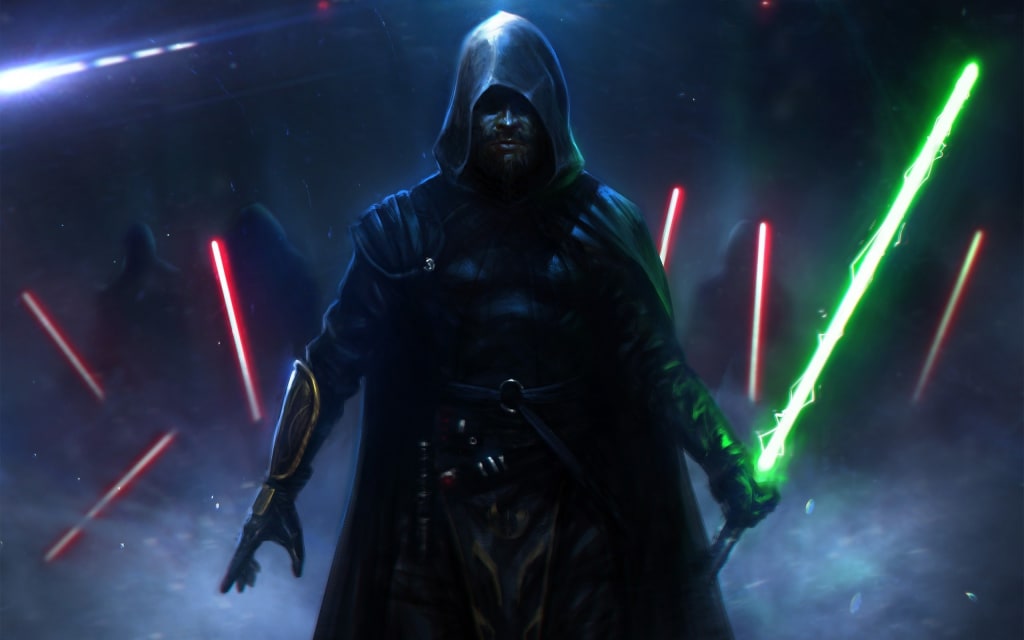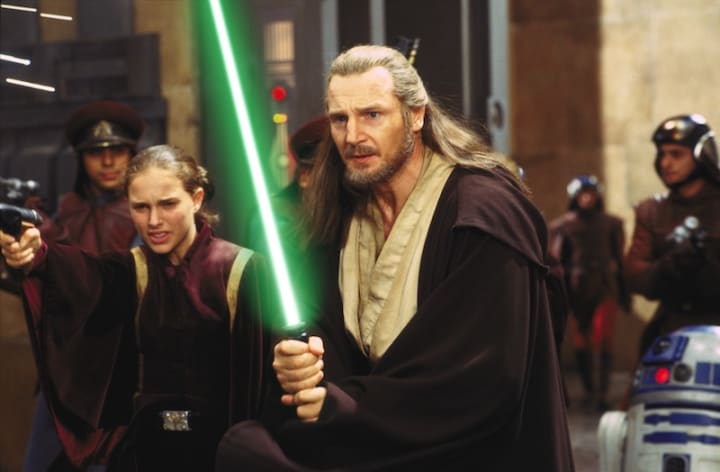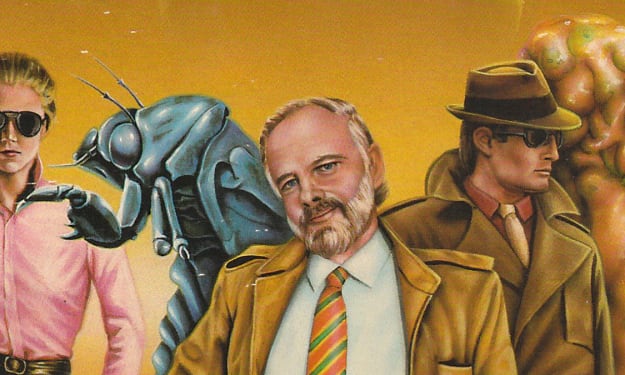
What was the point of Star Wars: The Last Jedi? *Spoiler Alert* Not only to end the Jedi Order, but to completely erase their being from the galaxy. Ignoring that fact, those Force wielding so-called "good guys" that almost act like a pseudo-police force in Star Wars may not be as good as we all thought them to be. While they may stand for order and justice, claiming to be the protectors of the entire universe, much of their belief system and ways of going about said "protection" aren't all that morally sound. After all, in contemporary terms, they are a religious cult that abducts children, irrationally sees themselves superior to pretty much anything within the galaxy, and are governed by a council of blind leaders that go about their businesses as if not only above the law, but in the name of order itself.
It’s quite simple to prove really, since more evidence of their villainy exists than on the contrary. They were the ones that allowed for Palpatine, or the evil Sith Lord known as Darth Sidious, to rise into the seat of Emperor. Not to mention, the Jedi singlehandedly condemned themselves by gaining control of an entire militaristic force, one they knew little about, that which eventually led to their annihilation and exile. It becomes more obvious as you delve into the practices and belief systems hidden under the surface of what is ostensibly called "the light side," and any rational deduction made should point out, without question, that the Jedi are the villains of Star Wars. This is not to say that their polar opposites are any better; in fact, the dark side of the Force is the misunderstood side. The Jedi are simply a bunch of power hungry bullies that pretend to bring, or serve, the balance of the Force, yet fail at every turn to make said balance a reality.
Selfishness

For most of us Star Wars fanatics, the prequels tend to be regarded with either shame, remorse, or simply annoyance, but they open up the inner cogs of the Jedi Order more so than any other film (besides The Last Jedi). One takeaway that can be made from the first three chapters that proves the Jedi are the villains in Star Wars is the entire Order's disregard for others; they say they work for the best interest of the galaxy, yet most of what they do tends to be in the advancement of their belief system, or to simply bolster their control in the senate.
To back this claim, take a look at the originals and just remember that both Yoda and Obi-Wan could have easily come out of hiding to help the Rebels in stopping the rise of the Empire, yet they decided to wait for an "opportune moment," which to them was the reconstruction of their cult. Also, at the end of Return of the Jedi, we see Luke Skywalker selfishly hand himself over to the Empire, which could have easily jeopardized the entire raid on Endor, and only amounted to a so-called non-existent bit of luck in the hope that Darth Vader would somehow turn good. Let's not even get into the High Council and their whole adoration for brandishing every action as "Jedi business."
Oppressiveness
Let's take into account the fact that the Sith were technically engineered by the Jedi, since the apparent dark side-wielders of the Force were first coalesced by fallen, exiled Jedi knights, most of whom were tired of being oppressed by their former masters, or sought more radical points of view in regards to keeping the galaxy free from harm. What best could prove that the Jedi are the villains in Star Wars than being the reason for the real villains' creation in the first place?
I mean, come one! The second prequel movie is literally called Attack of the Clones, keyword being "attack." The Jedi weren't curtailing a militant force from invading, nor were they protecting the interests of the people. The entire Clone Wars were adopted in order to stave off the Separatists and others from gaining their freedom from the Republic. Of course, there were darker aspects under the surface, but the whole reason for the Jedi involvement in the wars themselves were, in essence, to remain as valiant repressors and as an authoritative force for the Republic. Or, quite simply, to keep their power from dwindling any further.
Infallible Lawlessness
Similarly, while they may act as cosmic police that oversee the interests of democracy and order, they sure do love to burn the rule book whenever they see fit. They act as if they're the most powerful force in the galaxy, which allows them to insinuate on being judge, jury and executioner for Republic interests, despite the fact that they won't even act unless it deals with Jedi business in the first place.
Mace Windu, among the more prominent High Council members, is their biggest contender for this debate. Upon discovering that Chancellor Palpatine is a Sith Lord, his immediate reaction is:
"The Jedi Council will have to take control of the Senate to ensure a peaceful transition to a new government and a new leadership for the Republic."
Basically, good ole Mace feels that a military coup is a far more peaceful transitioning of power than going about the situation with a more moral approach, and then when he's attempting to arrest the Chancellor:
"He has control of the Senate and the courts! He's too dangerous to be kept alive!"
Yes, Palpatine may be the leader of an entirely evil and dark entity, but murdering him on the spot is their only and best option? Due process goes out the window, because the Jedi are the villains in Star Wars. Despite (or, maybe in spite) of their arrogant all-powerful mentality, the Jedi didn't even conjure up a way so as to limit the chancellor's reach and possibly diminish his authority; nope, lopping his head off was and still is their best option. We all know how that turned out.
Child Abduction
Akin to the likes of an egregiously demonic cult belief, the Jedi Order practice in the taking and training of young children from birth, which I may add is now a prominent tool of the First Order. The former are a little more sincere about it, asking for the child instead of abducting, but they're still all the more dispassionate about their families. Jedi are the villains in Star Wars because they completely forget their kin and tend to ignore them when in desperate need out of mere self-interest (there's that one again).
Case in point: Anakin Skywalker, who would then go on to become one of the galaxy's most ruthless villains, thanks largely to the repressive and misguided Jedi Code. We first meet Anakin in The Phantom Menace. Qui-Gon Jinn, another respected Jedi Master, releases the young boy from enslavement and inducts him as a Jedi padawan after discovering his extremely high level of midi-chlorians. Shmi Skywalker, on the other hand, is left behind and remains a slave, all because her midi-chlorian count was too low for Jedi attention and also because padawans are bred to forget their families. No wonder Anakin was so pissed off all the time, he didn't have his mommy when he needed her most (plus, she probably lived a pretty horrible life right up until that Tusken Raider incident).
Brainwashing
On top of kidnapping (or "volunteering," I should say) little younglings and handing them small laser swords to practice with until they're ripe of age, the Jedi Order literally brainwashes them into believing that the "right path" is the Jedi way, or in other words, to follow the light side of the Force. Not to say that the light side is the wrong path, but the Jedi forcing upon young children a set of misguided principles after having whisked them away from everything they've ever known? Harsh, wouldn't you say?
Not to mention the fact that they can literally bypass free will at the slightest twist of a wrist, it's increasingly clear that the Jedi are the villains in Star Wars. I know some might say, Well if used in the interests of good, isn't brainwashing... okay? Why don't you ask Kevin Decker, or read his Star Wars and Philosophy. In the interest of time: no, brainwashing is unethical in any situation for the necessity of free will. But, of course, not for the Jedi.
Close-Mindedness

One of the most puzzling scientific inaccuracies in Star Wars is how the Jedi can claim to be so intelligent and knowledgeable, yet practically fail in every endeavor imaginable. The Jedi are the villains in Star Wars simply by lacking in open-minded, outward beliefs. As can be witnessed in the treatment of a still-in-training Anakin Skywalker, not one person on the Jedi High Council accepts his opinion or advice, effectively shunning him from even gaining their trust from the start, and belittling his and many more young ones' mindsets.
In drawing upon even the most mundane conclusions for diplomacy, it's like the Jedi Council tries to be inflexible and as least transparent as they possibly can. Qui-Gon, as another example (and, might I add, one of the few who actually listened to Anakin) was ousted from the Council because he wanted to train two padawans instead of one. How about that time he revealed the existence of Darth Maul and the resurrection of the Sith? Yoda, like most other subsequent council members' responses, replied to him:
"Hard to see, the dark side is. We must investigate further before drawing a conclusion to the identity of your adversary."
Overconfidently Militant
In addition to a plentitude of overbearingly negative attributes, the Jedi are the villains in Star Wars for their sheer confidence and self-identity of preserving the authority of the galaxy. Mostly by way of force, and not the Force but literal force, the Jedi Council oversees not only the training of more and more of their own emotionless kind, but also begin to perceive themselves as generals with the institution of the Clone Wars.
This has happened before and isn't a new Jedi trait by any means, as it was a large theme amid the New Sith Wars, which saw the Jedi grow into the Army of Light. While they may have Force powers due to their genetic addition of midi-chlorians, they also practice the use of and are practically known galaxy-wide as the only faction (besides the Sith) with lightsabers. Is it me, or is it kinda strange seeing an ancient religious belief system, one that consistently harkens on peace and harmony, practice in the use of plasma weapons? Oh, they're also pretty keen on using them, like Obi-Wan chopping off the arm of that alien (Ponda Baba) pestering Luke in A New Hope.
Carelessness
Aside from the fact that they took up a military clone army they knew next to nothing about, the Order also went about the utilization and conduction of the Clone Army without any regard for the purposes of the Republic. In reality, the Jedi are the villains in Star Wars for engineering the so-called Clone Wars to essentially retain their power, or at least their positioning within the Senate and Republic. A long-deceased and well-respected Jedi, Sifo Dyas, may have been the one to initiate the clone garrisons, but why didn't the secrecy of it, or even the simple strangeness of it, raise any concern whatsoever?
Although they were desperate for an army, the Jedi could have easily investigated into the creation and background of the suspicious clone infantry produced on Kamino, yet they were just too preoccupied with foiling Palpatine and regaining the order, or rightful authority, of the Republic. The fact that Obi-Wan wasn't even in the slightest bit worried about Jango Fett's presence, or participation on the project, just shows how truly careless they all were, and an even more obvious rendition of the latter: Order 66. How, in all the galaxies, could one of the most intelligent, all-knowing, and mindful factions in the entire cosmos not foresee their inevitable downfall through the use of their own military force against them? Blind hope and useless meditation, on top of a galaxy-full of hubris, that's how.
Elitism

If the fact that the Jedi are the villains in Star Wars couldn't get any worse, how bout their identity as a member's only club, which also prides itself on being pretty much the coolest, most awesome group in the entire cosmos. Like poor old Shmi Skywalker and countless others, if you don't have the proper amount of midi-chlorians, which can only be ascertained by ancestral genetics, you're not fit to be a Jedi.
They're like the People's Temple meets Mean Girls, minus the cyanide and the overuse of pink overtones. A religious order that perpetuates harmony, yet belittles others and even race? Obi-Wan, all the wise and noble, still lets this one slip after Anakin and Qui-Gon leave off Tattoine:
"Why do I sense we've picked up another pathetic life form?"
He's referring to the especially fan-disliked character of Jar Jar Binks, but also unknowingly pointing out Anakin. This is a common trait shared by both Obi-Wan and Qui-Gon throughout The Phantom Menace, but is also portrayed in countless other Jedi. If you're not in the business of the Jedi, which you can't be unless you were born that way, then you're just not Jedi business.
Antipathetic
One of the Jedi's most cherished forms of belief is emotional restraint, a kind of sharpened indifference, apathy, and ignorance of one's feelings, which are all indoctrinated over a long period of time, and even then still might never actually be achieved. Obi-Wan, a revered and praised Master Jedi disciple, proves of his inability in subduing emotions when, in the end of Revenge of the Sith, he screams at Anakin in despair:
"You were my brother, Anakin. I loved you."
It may not quite prove that the Jedi are the villains in Star Wars, yet it does point out why they seem to ignore practically anything that doesn't pertain to "Jedi business," in addition to their various individual flaws. Being entirely antipathetic, for one, gives the High Council no real basis for their Order's direction, or point of view in the eyes of democracy—I mean, why care if you're so against having emotions in the first place? Oh, that's right, power. Even with dealings between each other, they either lie or thrust others down for the sake of their own close-minded opinions. Subjugation of antipathetic attitudes has led the Jedi, supposedly these enlightened peacekeepers, into showing no remorse; did they ever display any concern for their victims or victims' families, self-caused collateral damages, or even the existence of non-Jedi? Nope, not even a tear was shed for all the X-Wing casualties Obi-Wan just allowed to happen before he ghost-whispered the correct instructions for Luke to destroy the Death Star. Sorry, Porkins.
Misguidedness
Cue in, "The sacred texts!" But, what are those exactly? For many die hard Star Wars fans, especially those of us who simply love to rip on the Order, it has become increasingly obvious that the Jedi have no real principles, or set guidelines to follow in conducting their beloved Jedi business. They may say they follow the "Jedi Code," but then what is that exactly? Oh, right, the complete disregard for emotion, family, self, and—don't need this at all—rationality.
Here's the Jedi Code, taken from Christine Golden's Dark Disciple:
There is no emotion, there is peace. There is no ignorance, there is knowledge. There is no passion, there is serenity. There is no chaos, there is harmony. There is no death, there is the Force.As you can see, they're not so much rules, but ways to live by, and while some of them are good in nature, they holistically lack what Jedi are supposed to do, how they're supposed to do it, and even why. Secondly, without passion, emotion, or even just a teeny bit of ignorance, or plain old mistake, you end up with a completely close-minded and inattentive personality, one that ignores rational issues by administering peace and harmony in an almost ruthless fashion. Hence, the Jedi are the villains of Star Wars, and if you can't already see it, maybe you should rewatch the entire saga once more for a fresher take. Or, simply meditate, like a Jedi would.
About the Creator
Ryan Epps
A cosmic adventurer rendering wayward letters into infinite lengths of conception and prose, like quantum streams of pneumatic information






Comments
There are no comments for this story
Be the first to respond and start the conversation.